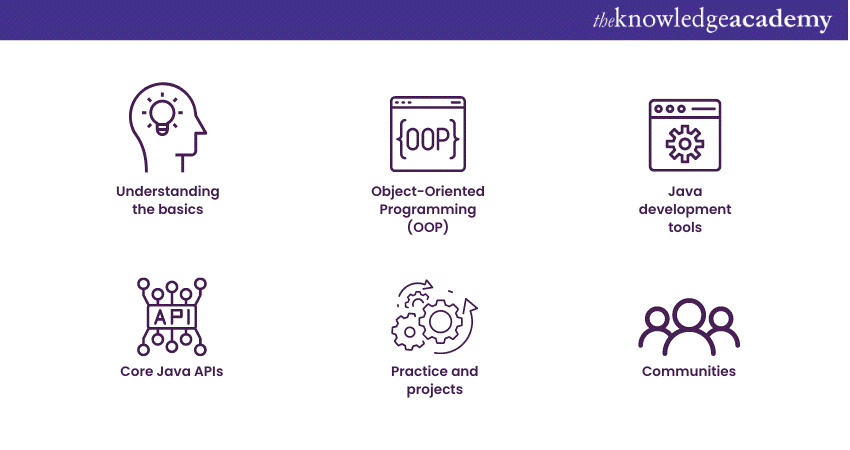We may not have the course you’re looking for. If you enquire or give us a call on 01344203999 and speak to our training experts, we may still be able to help with your training requirements.
Training Outcomes Within Your Budget!
We ensure quality, budget-alignment, and timely delivery by our expert instructors.

Learning How to Become a Java Developer opens a world of opportunities in Software Development. Java is a versatile and widely used programming language known for its reliability, scalability, and platform independence. Beginners looking to start a career in programming can often feel confused about how to approach this process.
If you wish to understand the fundamentals of Java Programming and explore advanced concepts and build real-world applications, this blog will equip you with the necessary tools and insights to thrive in the exciting field of Java Development. Learn How to Become a Java Developer with this step-by-step guide and tips to help you navigate your journey towards becoming a skilled Java Developer.
Table of Contents
1) Understanding Java Development
2) Qualifications to become a Java Developer
3) Learning Java Programming language
4) Building real-world Java applications
5) Growth and learning
6) Conclusion
Understanding Java Development
The term "Java Development" refers to the process of creating powerful software applications using the Java Programming language. Java is a versatile and widely adopted language known for its simplicity, reliability, and platform independence. Java Development encompasses various stages, including coding, testing, debugging, and deployment, to deliver robust and scalable applications.
What is Java Development?
Java Development involves writing code in the Java Programming language to create applications that run on different platforms, including desktops, mobile devices, and embedded systems. Java's object-oriented nature allows developers to build modular and reusable code, promoting code organisation and maintainability.
The Java Virtual Machine (JVM) enables platform independence, making Java applications compatible with multiple operating systems. Java Development offers a wide range of tools, libraries, and frameworks that simplify application development and enhance productivity.
Choosing to become a Java Developer
There are several compelling reasons to choose Java Development. Firstly, Java's popularity and widespread adoption ensure a vast job market with numerous career opportunities. Java's extensive ecosystem provides a wide range of libraries, frameworks, and tools that facilitate application development and accelerate time-to-market.
Java's platform independence allows applications to run on various operating systems, reducing compatibility issues. The language's emphasis on security, performance, and scalability makes it suitable for building enterprise-level applications.
Java's extensive community support and resources, including documentation, online forums, and open-source contributions, make it easier for developers to learn, grow, and collaborate. Overall, Java Development offers a robust and versatile environment for building powerful and scalable software applications.
Interested in becoming a Java Developer? Try our Java Training Courses today!
Qualifications to become a Java Developer
Becoming a Java Developer requires a combination of educational qualifications, technical skills, and personal attributes. While specific requirements for a role as a developer may vary depending on the job market and employer, there are certain qualifications that can enhance your prospects as a Java Developer.
1) Educational background: A bachelor's degree in computer science, software engineering, or a related field is commonly preferred by employers. This provides a strong foundation in programming concepts, algorithms, data structures, and Software Development principles.
2) Java proficiency: A deep understanding of the Java Programming language is essential. Familiarise yourself with Java syntax, object-oriented programming concepts, and core APIs. Gain expertise in working with Java frameworks, libraries, and tools commonly used in the industry.
3) Problem-solving skills: Java Developers need strong analytical and problem-solving abilities to design efficient and robust solutions. Being able to break down complex problems, identify patterns, and implement effective solutions is crucial.
4) Development lifecycle: Understanding the Software Development lifecycle and its various stages, including requirements gathering, design, coding, testing, and deployment, is important. Familiarity with different development methodologies, such as Agile or Scrum, is also beneficial.
5) Database knowledge: Java Developers often work with databases to store and retrieve data. Having knowledge of SQL and database concepts, as well as experience with popular database management systems, can be advantageous.
6) Collaboration: Java Developers often work as part of a team, collaborating with other developers, project managers, and stakeholders. Having nice verbal and written communication skills are important for effective collaboration and conveying ideas.
7) Continuous learning: The technology landscape is constantly evolving, so being open to learning new frameworks, languages, and tools is essential for a Java Developer's growth and adaptability.
Learn more about programming in Java with our Java Programming Course!
Learning Java Programming language
Learning Java Programming is an exciting journey that opens up a world of opportunities in Software Development. Whether you're a beginner or an experienced programmer, mastering Java can pave the way for a rewarding career. Here are some key steps to embark on your Java Programming learning path:

1) Understanding the basics: Start by familiarising yourself with Java syntax, data types, variables, and control structures. Learn how to write and execute simple Java programs using an Integrated Development Environment (IDE) or a text editor.
2) Object-Oriented Programming (OOP): Java is an object-oriented programming language, so understanding OOP concepts like classes, objects, inheritance, polymorphism, and encapsulation is crucial. Practice implementing OOP principles in your code to build modular and reusable applications.
3) Java Development tools: Explore popular Java Development tools and environments such as Eclipse, IntelliJ IDEA, or NetBeans. These tools provide features like code completion, debugging, and project management, enhancing your productivity as a Java Developer.
4) Core Java APIs: Java offers a rich set of libraries and APIs for various functionalities. Familiarise yourself with the Java API documentation to leverage built-in classes and methods for tasks like input/output operations, data manipulation, and networking.
5) Practice and projects: The key to mastering Java Programming lies in hands-on practice. Solve coding exercises, work on mini-projects, and tackle programming challenges to strengthen your skills and gain practical experience.
6) Communities: Take advantage of online tutorials, forums, and Java Developer communities to enhance your learning. Join coding communities, participate in discussions, and collaborate with other developers to gain insights and expand your knowledge.
Building real-world Java Applications
Building real-world Java applications is an exciting and rewarding endeavour that allows you to apply your Java Programming skills to create practical solutions for various industries and domains. Here are the key steps to consider when building real-world Java Applications:
Understand application requirements
Start by thoroughly understanding the requirements of the application you intend to build. This includes gathering information about the desired features, functionality, user expectations, and any constraints or limitations.
Design and architecture
Plan the structure and architecture of your Java application. Identify the key components, modules, and their relationships. Utilise design principles and patterns, such as Model-View-Controller (MVC) or Service-Oriented Architecture (SOA), to ensure a clean, scalable, and maintainable codebase.
Frameworks and libraries
Leverage Java frameworks and libraries to expedite development and enhance the functionality of your application. Frameworks like Spring, Hibernate, and JavaFX provide robust tools and features for building web, enterprise, and desktop applications. Utilise libraries for specific functionalities like data manipulation, networking, or user interface development.
User Interface development
Design an intuitive and user-friendly interface for your application. Utilise GUI libraries like JavaFX or web development frameworks like JavaServer Faces (JSF) or Spring MVC to create visually appealing and interactive user interfaces. Pay attention to usability, responsiveness, and accessibility aspects.
Database integration
Incorporate database functionality into your Java application. Use Java Database Connectivity (JDBC) or Object-Relational Mapping (ORM) frameworks like Hibernate to interact with relational databases, store data, and retrieve information. Design an appropriate database schema and implement efficient data access strategies.
Testing and quality assurance
Implement comprehensive testing strategies to ensure the reliability and functionality of your application. Utilise unit testing frameworks like JUnit or TestNG to write automated tests that verify the correctness of individual components. Perform integration testing to ensure proper communication and functionality between different modules. Additionally, conduct user acceptance testing to validate the application's behaviour against the intended requirements.
Deployment and maintenance
Prepare your application for deployment by packaging it into executable files or deploying it to cloud platforms. Consider containerisation using technologies like Docker for improved portability and scalability. Establish maintenance processes to handle bug fixes, updates, and improvements throughout the application's lifecycle. Monitor the application's performance and user feedback to continuously enhance its functionality.
Continuous improvement
Keeping up with the latest trends, development practices and framework advancements in the Java ecosystem is vital for successful development career. Continuously enhance your skills by exploring new technologies, frameworks, and best practices. Engage with the Java Developer community, participate in online forums, attend conferences, and join coding communities to learn from and collaborate with fellow developers.
Try our Introduction To Java EE Training Course and learn about Java API in detail!
Growth and learning
Continued growth and learning are crucial in the field of Java development. Reading industry blogs, following reputable sources and engaging with the Java community can be vital to this step. Expand your skill set by exploring related technologies and tools, such as front-end development or back-end frameworks.
Practice your Java Programming skills regularly through coding challenges and personal projects. Embrace new technologies and languages that complement Java and consider their integration into your applications. Engage in continuous education through online tutorials, courses, and certifications to deepen your knowledge and acquire recognised credentials. Collaborate and network with peers and experts in the Java community to exchange ideas and gain insights.

Conclusion
Becoming a Java Developer requires continuous learning and growth. By staying updated, expanding your skill set, regularly practising, embracing new technologies, engaging with the community, seeking feedback, and setting goals, you can thrive in this dynamic field. Embrace the journey of growth and let your passion for Java Development propel you towards success.
Try our Java Programming and Software Engineering Fundamentals Training today!







 Top Rated Course
Top Rated Course



 If you wish to make any changes to your course, please
If you wish to make any changes to your course, please


